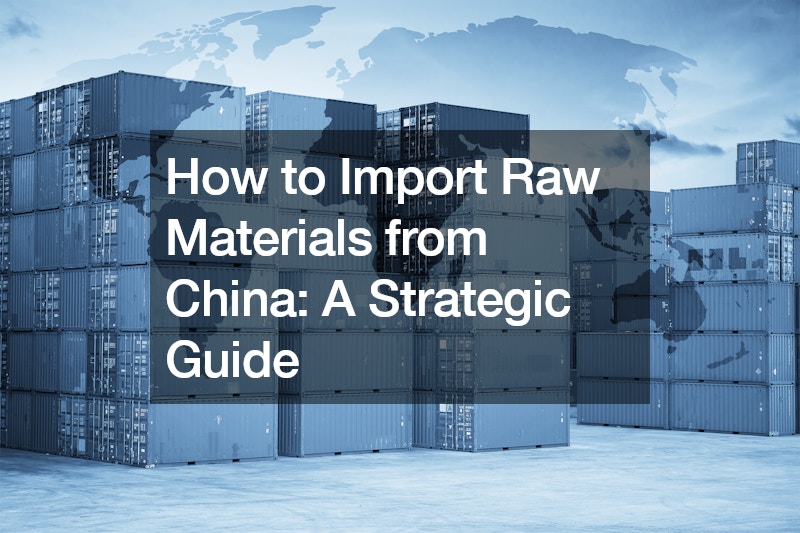In the global marketplace, China stands out as a key player in the supply chain, particularly when it comes to raw materials. Its status as the world’s largest exporter makes it a prime destination for businesses seeking to source raw materials efficiently and cost-effectively. However, importing raw materials from China requires careful planning and strategic decision-making to navigate the complexities of international trade. In this comprehensive guide, we’ll explore how to strategically import raw materials from China, providing actionable insights and tips for success.
Understanding Raw Materials China:
China’s vast manufacturing sector relies heavily on imported raw materials to fuel its production processes. From metals and minerals to agricultural products and textiles, the country imports a wide range of raw materials from various countries around the world.
Despite being a major producer of many goods, China’s domestic resources are often insufficient to meet its industrial demands, necessitating imports to sustain its economic growth.
Identifying Key Raw Materials:
Before diving into the import process, it’s essential to identify the specific raw materials your business requires. China offers a plethora of raw materials for export, including but not limited to:
Metals and Minerals:
China is a significant exporter of metals such as steel, aluminum, and copper, as well as minerals like iron ore and rare earth elements.
Agricultural Products:
The country is a major exporter of agricultural commodities such as soybeans, corn, wheat, and rice.
Textiles and Apparel:
China is a leading exporter of textiles, fabrics, and apparel, catering to global demand for clothing, home textiles, and industrial textiles.
Chemicals and Plastics:
China exports a wide range of chemicals, including petrochemicals, fertilizers, and plastics, used in various industries such as agriculture, manufacturing, and construction.
Finding Reliable Suppliers:
Once you’ve identified the raw materials needed, the next step is to find reliable suppliers in China. Utilize online sourcing platforms, trade directories, and industry networks to connect with reputable suppliers who can meet your requirements. Look for suppliers with a proven track record of quality, reliability, and ethical business practices. Conduct due diligence by verifying supplier credentials, inspecting product samples, and visiting manufacturing facilities if possible.
Negotiating Contracts and Terms:
Negotiating favorable contracts and terms with your Chinese suppliers is crucial for a successful importation process. Clearly define the terms of the agreement, including pricing, payment terms, delivery schedules, and quality standards. Consider incorporating clauses for quality control, product inspection, and dispute resolution to protect your interests. Establish open communication channels with your suppliers to address any issues or concerns promptly.
Managing Logistics and Shipping:
Efficient logistics and shipping are vital aspects of importing raw materials from China. Partner with reliable freight forwarders and logistics providers to manage the transportation of goods from China to your destination. Consider factors such as shipping methods, transit times, customs clearance procedures, and import duties when planning your logistics strategy. Optimize your supply chain to minimize delays and reduce costs while ensuring timely delivery of raw materials.
Navigating Regulatory Compliance:
Navigating regulatory compliance is essential when importing raw materials from China. Familiarize yourself with import regulations, customs procedures, and documentation requirements in both China and your destination country. Ensure that your shipments comply with all applicable laws, regulations, and quality standards to avoid customs delays or regulatory penalties. Work closely with customs brokers and legal advisors to ensure compliance with import regulations.
Quality Control and Assurance:
Maintaining quality control and assurance throughout the import process is critical to ensure the integrity of your raw materials. Implement rigorous quality control measures, including product inspections, testing, and certification, to verify the quality and authenticity of imported goods. Establish quality assurance protocols with your suppliers to monitor product quality consistently and address any issues promptly.
Building Strategic Partnerships:
Building strategic partnerships with your Chinese suppliers is key to long-term success in importing raw materials. Foster open and transparent communication, establish trust, and cultivate mutually beneficial relationships with your suppliers. Collaborate on continuous improvement initiatives, innovation, and supply chain optimization to drive efficiencies and enhance competitiveness in the marketplace.
In conclusion, importing raw materials from China offers significant opportunities for businesses seeking to optimize their supply chains and gain a competitive edge in the global market. By following strategic guidelines and best practices outlined in this guide, businesses can effectively navigate the complexities of importing raw materials from China, ensuring reliability, quality, and efficiency in their supply chain operations. Whether you’re a seasoned importer or new to international trade, leveraging the strategic insights provided in this guide will empower you to import raw materials from China successfully
.
